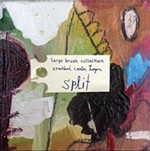Lucinda Williams
The Ghosts of Highway 20 (Highway 20)
Reviewed by Jim Caligiuri, Fri., Feb. 12, 2016
For some, albums such as Lucinda Williams' self-titled third LP in 1988 and/or its two follow-ups, Sweet Old World (1992) and Car Wheels on a Gravel Road ('98), would be highlights enough to make a career. Instead, nearing four decades since her debut, the onetime local continues taking listeners to places unexplored. It's easy to argue that her previous release, 2014 double-disc Down Where the Spirit Meets the Bone, brought the 63-year-old song whisperer to a new plateau, a remarkable achievement in a life overflowing with them. Two main themes circle each other on the sprawling, two-CD The Ghosts of Highway 20. One concerns stories Williams found along Interstate 20, stretching from South Carolina to West Texas. The route through some of the Deep South where she grew up has long proved fertile ground for her. This holds especially true on the languid "Louisiana Story," a vivid recollection of simpler times. The title track also howls unforgettable imagery spurred by intense interplay between Bill Frisell and Greg Leisz. The guitarists' connection throughout proves spine-tingling. Williams addresses the passing of her father, renowned poet Miller Williams, using his own words on forlorn opener "Dust." Thirteen songs later, the set bookends with the nearly 13-minute-long meditation "Faith & Grace," a call to the spirits for a sense of peace that recalls similar rambles from Van Morrison. She also borrows from Woody Guthrie and Bruce Springsteen. "House of Earth," the former's words applied to her music, describes a den of sin presented languorously and without inhibition. Springsteen's "Factory," from Darkness on the Edge of Town, adds some human desperation to the ghost stories. The Ghosts of Highway 20 finds Lucinda Williams bending Americana with jazz phrasing, lush grooves, and unrestrained spirit.
![]()
![]()
![]()
![]()













